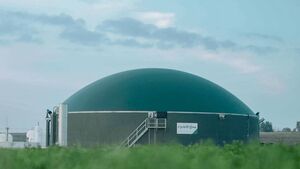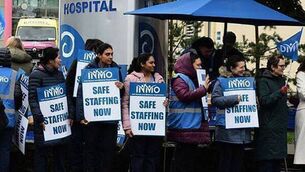Ballyvass Bio Concern Group join forces with local representatives against proposed biomethane plant

Photo for illustrative purposes only
BALLYVASS Bio Concern Group convened once again in Castledermot Community Centre, joined by community members and local representatives ready to support the cause.
The group has rallied together in response to a proposed industrial-scale biomethane plant planned for the outskirts of the town at Ballyvass. The plant, which has been proposed by European company CycleØ, is of huge concern to local residents for the potential risks it carries.
To date, residents feel that they have received little to no concrete information from the company. With no established track record in Ireland or elsewhere, residents are anxious about the safety and sustainability of a facility of this scale.
Group Chairperson, John Phelan, opened the meeting, welcoming attendees and outlining the evening’s agenda. Sandra O’Dwyer of the working group shared an update on their efforts behind the scenes, particularly sharing that the group has joined forces with the National Biogas Concern Group (NBCG) – a coalition of similar community groups across Ireland opposing biogas projects in unsuitable rural areas.
The NBCG recently hosted briefing sessions in Buswells Hotel in Dublin, where the group presented their case to public representatives from Kildare South and beyond.
The group is calling on the government to urgently introduce clear legal standards and statutory planning regulations, including minimum setbacks from homes and water sources.
Sandra expressed gratitude to the local representatives from Kildare South who have supported the group and reminded the crowd: “A steadfast community bound by purpose can stop even the mightiest machines.”
Working group member Paddy Byrne delivered a detailed presentation highlighting the potential negative impact the plant would have on the area.
Chief among the concerns is the dramatic increase in heavy goods vehicle (HGV) traffic — operating six days a week — which would significantly disrupt the town’s daily life.
Paddy emphasised that Castledermot is beginning to thrive and that this type of industrial development could threaten both local businesses and residents’ quality of life.
Mark Wall TD addressed the meeting, comparing the Ballyvass situation to the recently successful Ballyshannon campaign, which fought off an ill-suited proposal. He stressed that the narrow roads, small towns, and villages in the area are simply not designed to support this level of HGV traffic. Landmarks such as Mullaghcreelan Woods and Kilkea Castle would also be affected by the plant if it were to go ahead.
Quoting his colleague Alan Kelly, Deputy Wall called the proposal "bananas" and completely unfit for the area. He pointed to Monasterevin as a more appropriate location—close to major roads and motorways.
“This is industrialisation of a rural community – close to homes where families have built their lives and planned futures for their children. This is only the beginning, and we must all stick together. In Kildare South, party politics will be set aside — we’ll all wear the white jersey to support this community,” said Deputy Wall.
Cllr Mark Leigh pledged full support and informed the crowd that Kildare County Council (KCC) had already paused wind farm applications pending updated Government guidelines. He assured that he will table a motion at the next council meeting to do the same for biogas plants.
His council colleague, Fianna Fáil's Vera-Louise Behan, emphasised the inappropriateness of the Ballyvass location and confirmed that no road upgrades are planned for the are – something that would be essential if such a facility were to proceed.
Labour councillor Aoife Breslin echoed these concerns and referenced the Castledermot Town Team Plan, which outlines a more positive, community-focused vision for the town. She assured attendees of her ongoing support but warned that the fight may be a long one.
Newly appointed Cathaoirleach of Athy MD Ivan Keatley gave his support to the group and said that, unlike Ballyvass, Monasterevin’s proposed plant made logistical and environmental sense, being located near a Diageo facility with motorway access.
He also mentioned Nurney’s proximity to pig farms and Kildare Chilling as further justification for why those locations are better suited.
“This proposal doesn’t make business or environmental sense. Where’s the byproduct coming from? I don’t see the model working here,” he said, adding that the odour from HGVs alone would be a major concern.
During the Q&A session, one attendee asked if the plant would generate local employment.
Paddy Byrne believed that the construction would be modular and done overseas, with minimal employment of only 3–4 highly specialised roles operating during the day and possibly one at night.
The overall sentiment in the room was clear: Ballyvass is not the right location for an industrial biomethane plant. Locations like Monasterevin and Powerstown, both within 20–30 km, already have existing infrastructure, proximity to feedstocks, and suitable transport access.
This raised a critical question: Is another plant even needed in this area, and would there be sufficient feedstock to sustain it?
Concerns were also raised that CycleØ could build the plant and then sell it on — or expand it — bringing even more disruption.
Attendees expressed deep concern with the EPA’s powers to oversee the correct operation and running of these plants, fearing that once built, the plant would operate with minimal regulatory enforcement.
The group announced the launch of a GoFundMe campaign to raise funds for traffic and environmental assessments as well as other important items to move the campaign along once a planning application is lodged.
The GoFundMe 'Oppose large biomethane plant at Ballyvass, Castledermot' has seen great support since its launch on Wednesday, July 30 – with over €1000 raised so far.





